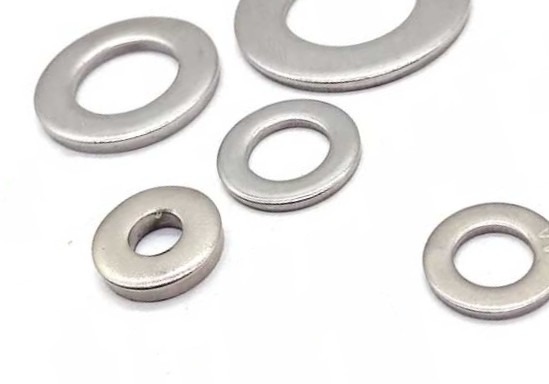What Are The Functions Of Different Types Of Washers
Washers are usually used in bolted connections, but some bolted connections do not require washers. Some bolted connections use flat washers, some use spring washers, and some use flat washers plus spring washers. So what are the functions of different washers?
What is the function of the flat washer?

Flat washers are generally thin pieces of various shapes that prevent leakage, reduce friction, isolate, prevent loosening, or distribute pressure.
1. Flat washers reduce damage to the substrate surface by the bolt head.
Since the bottom of the bolt head is not smooth, the surface of the substrate can be damaged by friction when a harder bolt is screwed onto the substrate. The use of flat washers can reduce damage to the substrate surface by the bolt head.
On the occasion when bolts need to be disassembled frequently, flat washers can protect the surface of the connected parts from being scratched. We place flat washers at the nut or bolt head to prevent the surface of the connected parts from being scratched, especially for precision machined surfaces.
2. For some connections that require more precise friction coefficients:
Bolts, nuts, and washers supplied by the same manufacturer are usually used in this connection. Bolt manufacturers will treat nuts and washers accordingly to ensure that the coefficient of friction between nuts and washers remains consistent.
3. Flat washers prevent substrate sinking
When the bolt is tightened, an axial force will be generated. When the axial force is applied in a small range, the base material may collapse because it cannot bear the force. Especially when the substrate is soft and thin, the collapse will be more serious. Substrate sinking can be reduced by using flat washers.
Because in the bolted connection, the pressure transmission of the bolt head or the bearing surface of the nut gradually expands in a trumpet shape, and the larger the bearing surface, the smaller the compressive stress. Therefore, adding a flat washer can reduce the compressive stress on the contact surface of the connected parts.
What is the function of the spring washer?

1. Increase friction between nut and bolt
It is mainly to give force to the nut after the nut is tightened to increase the friction between the nut and the bolt. It can prevent the loosening of the fastening bolts caused by the vibration of the equipment in operation.
2. The spring washer can prevent loosening and increase the pre-tightening force, but the flat washer does not have this function. Some important connections, such as places that mainly rely on compression to generate friction to transmit power, cannot use spring washers.
Spring washers are generally used in occasions where the bolt pre-tightening force is not high and the dynamic load is small. At present, a large number of tests have confirmed that the anti-loosening effect of the spring washer is not great. Therefore, it is not recommended to use spring washers for fastening occasions with large preload and important connections.
However, for electrical connection joints, the spring washer still has a certain effect on the final complete loosening, especially when it is loose to a certain extent, at this time the spring washer can still play a certain role.
3. When the clamping length of the bolt is short, the stress relaxation of the bolt is obvious, and the spring washer can make up for the stress relaxation.
When can a washer be used without it?

1. When using flange face nuts or bolts:
Due to the larger contact area of bolts or nuts on the flange surface, washers are generally no longer needed to increase the contact area and reduce compressive stress.
2. When using shear stress bolts (reamed hole bolts):
The use of shear stress bolts generally does not require washers. Because the shear stress bolt does not require too much preload, and it does not bear axial force during work. In this case, the bolt holes are generally relatively small, and the bearing surface of the nut or bolt head is generally relatively large, so the connected parts can bear the pressure without reducing the compressive stress.
KENENG can produce a variety of fasteners, including bolts, nuts, washers, rivets, screws. If you need, please contact KENENG.



